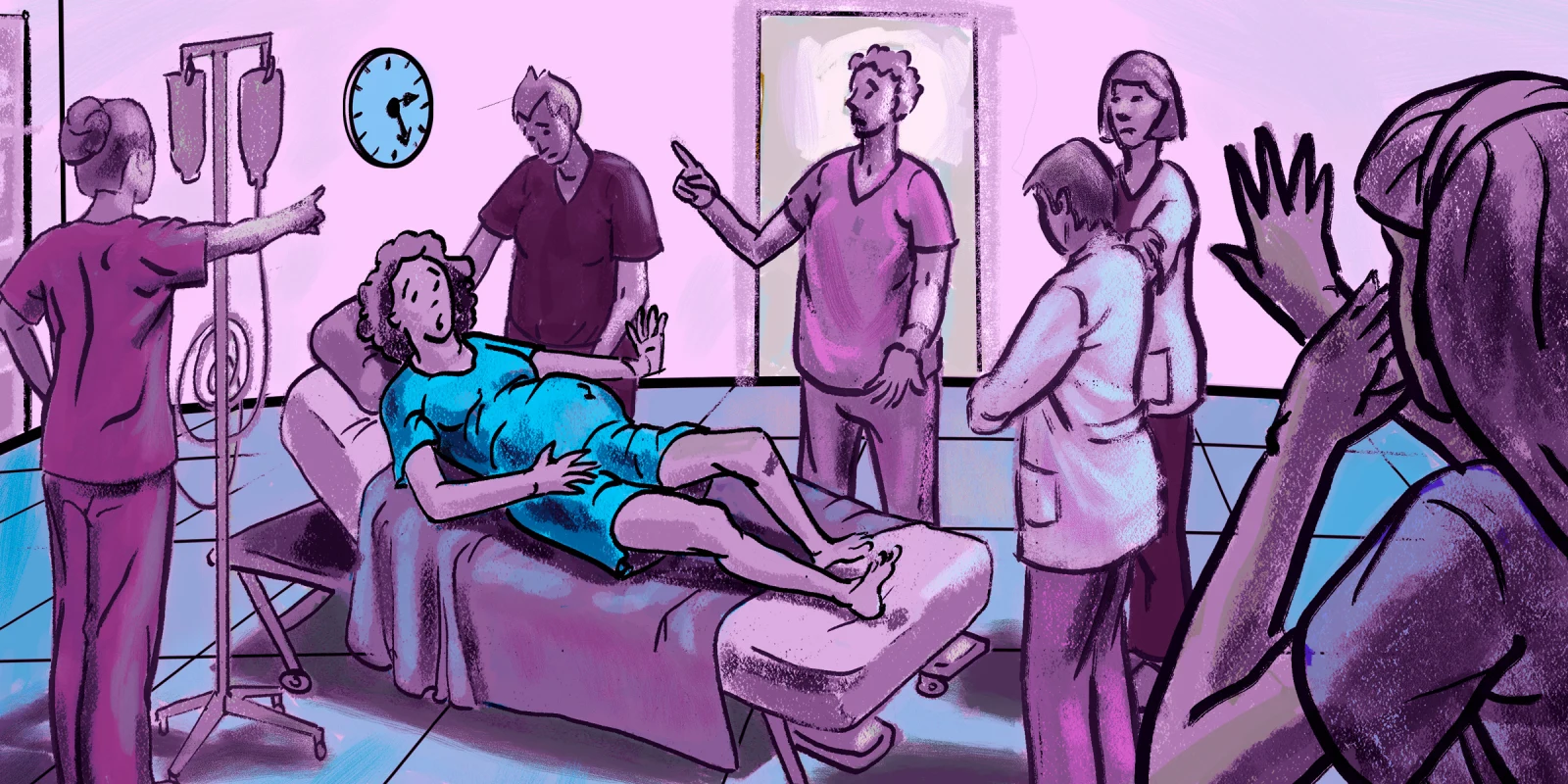The resident walked out of Room 442, crying. It was surprising to see doctor-tears so out in the open. I watched as Jennifer, the ob/gyn in training, angrily walked to the clinician workroom. “This patient is basically going to kill her baby."
The patient, Athena, had been sent to labor and delivery from the perinatal testing center. She had been seen for decreased fetal movement a week past her due date. The fetal heart tones were concerning enough to warrant an induction of labor. Athena had obviously not planned for this; she arrived at the labor and delivery floor with not only her husband, but her two toddlers. Half-listening to the details of synthetic oxytocin administration and artificial rupturing of membranes, Athena frantically sent text messages to organize last-minute child care. Now, years later, as a mother of young children myself, I understand this anxiety all too well — cups of hospital ice water can only entertain little ones for so long.
Over the next hour, the team watched the fetal heart monitor from the nursing station as it showed minimal variability and periods of recurrent decelerations. Jennifer translated this for me, only a medical student at the time: "There is decreased blood flow to the baby. She needs a C-section." Change of shift was happening in an hour, so the team moved quickly to set up the OR and let the supervising attending physician know. All that was left was to tell Athena that she was going to have surgery.
“She is refusing the C-section," Jennifer explained, wiping away her tears of exhaustion with her fleece sleeve. "She wants to wait until her husband comes back from dropping off their children and she is calling someone who has some medical knowledge but clearly not enough.”
The attending physician had arrived by this time to start the operation, only to find an empty OR. “Fine," the attending replied to the situation. "Have her sign an against medical advice form. She can have her dead baby. I’m going to the ER to evaluate an ectopic pregnancy. Call me if anything changes.”
All the while, I (with my lack of medical expertise and team significance) listened attentively. This woman they were describing did not remind me of the Athena I had met for 30 minutes when she first arrived. We had talked about her two previous vaginal deliveries at that very hospital and how she loved the experience and all the staff. She loved her children, and worked hard as a home health aid to provide for her family. Somehow she also managed to be the primary caregiver for her dad who was paralyzed from a stroke.
The nurse manager arrived to mediate the situation. Fortunately, the fetal heart strip was looking better. "How about we try more synthetic oxytocin and give her a second trial with a specific end time and have her sign the C-section consent form?”
I felt like I had made a connection with Athena. Maybe I could offer to talk to her without ultimatums? The team began to walk toward her room, just as I found the courage to say I had a good relationship with her. "Maybe I could speak with her?"
“No," replied Jennifer. "You should actually just go home now. This is not a good time to learn."
After a terrible night of sleep, full of doubts, wonders, and ruminations, I went to see Athena in the morning. She was cuddled up in the hospital bed with her husband and a baby girl in the bassinet as close to their bed as possible. Athena gave me a familiar, warm smile. “How did it go?” I asked, trying to keep it as open-ended as possible.
“It was so scary," she whispered, hoping not to wake her baby. "I feel so awful that the doctors had to see me so angry. They were trying to do their job and were worried about me and the baby."
I took a seat to hear her story. The medical team had started an IV and medications right when she arrived without her understanding why. What felt like soon after, medical personnel were in her room telling her she was going to kill her baby. “I was so scared, I panicked and told them I was just going to leave." She paused before deciding to share that the way the medical team spoke with her reminded her of the verbal abuse used by her parents. "I just wanted more time, I knew my body could do it." Avoiding surgery was so important to enable her to be the primary caregiver not only for her kids, but also her disabled dad.
“I was a subject on an assembly line, one, two, three." She was adverse to this depersonalization; it's the reason she only worked in home care and not an institution. "I’d rather spend my day with one person and get to really know them.” Athena explained that once she felt she had more time, and the negative energy left the room, her body turned on and knew exactly what to do. She went from side to side; she got on her hands and knees and rocked back and forth. Two hours later, Athena was completely dilated and pushed for 15 minutes.
Jennifer, the resident from yesterday, had already come by in the morning and focused on how things went smoothly. Athena acted the same, telling me she thanked Jennifer profusely and said she was so happy everything worked out. But secretly, she revealed to me, "I feel so guilty for being a bad patient and a bad mother.” I wish I could have known what Jennifer truly thought about the situation.
I am in no way a medical expert in what happened with Athena. I cannot even imagine the stress of obstetricians in keeping both mothers and babies safe and healthy and the times they have seen mothers and babies die. The stakes are beyond high. But what I witnessed, and continue to witness in the culture of medicine, is varying levels of tolerance when patients speak their mind, question the protocol, and disrupt the flow. While there are accepted diagnostic criteria, treatment guidelines, institutional and provider preferences, the role of the patient in the medical decision-making process is much more ill-defined. This is particularly true when individual preferences differ from the status quo. Clinicians, in turn, can interpret patient reluctance or curiosity as evidence of irresponsibility or distrust.
I wish we had used an opportunity to debrief about, or even with, Athena. Rather than individuals trying to listen to one another and reaching a shared understanding, the emotional intensity of medical situations often leads to frustration and labeling, coupled with suppression of feelings and discomforts. If only we gave the appropriate and necessary time to address the fear, the guilt, and the blame experienced on both sides of the clinical aisle. We could ask ourselves a few important questions. What could we have done differently? What did we learn? And how can we use this information in the future?
How do you handle patients who don't "comply"? Share your strategies for finding common ground in the comments.
Charlotte Grinberg is a fellow in hospice and palliative medicine at Beth Israel Hospital in Boston, MA. Her writing has appeared in JAMA, Health Affairs, and the Annals of Internal Medicine. She tweets at @drcharlotteG. She was a 2020–2021 Doximity Op-Med Fellow and continues as a 2021-2022 Op-Med Fellow.
All names and identifying information have been modified to protect patient privacy.
Illustration by Jennifer Bogartz







